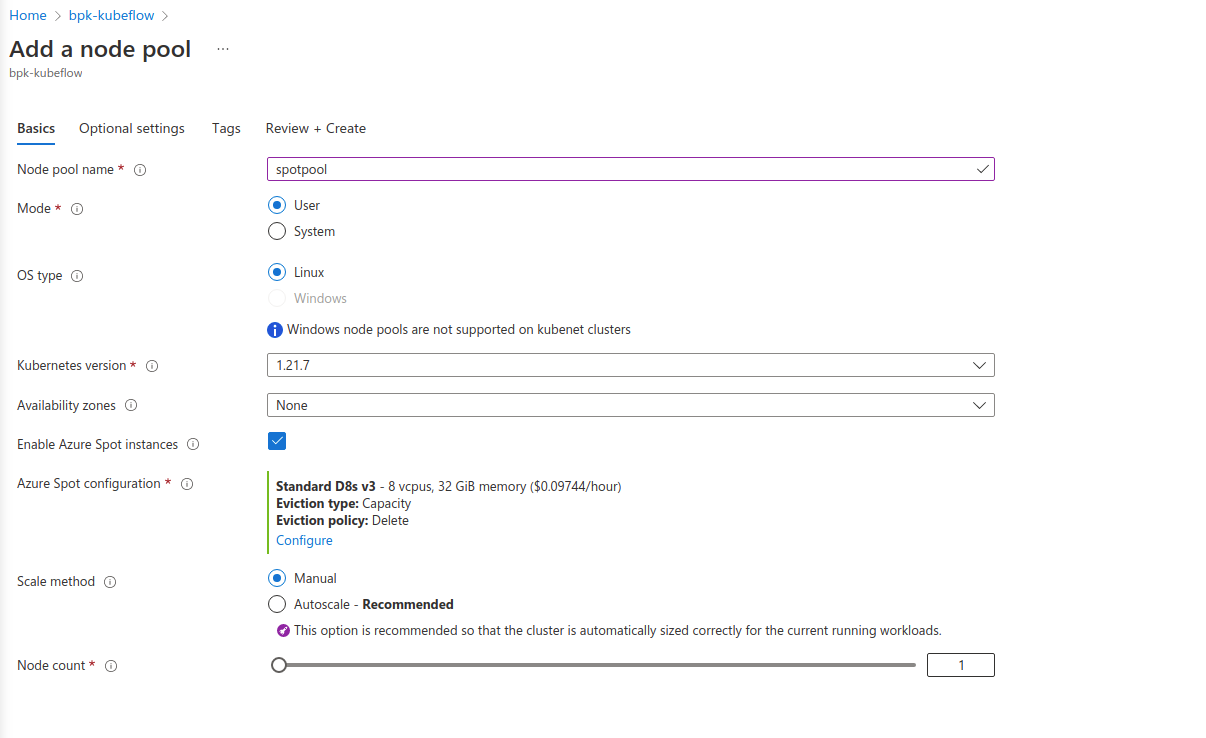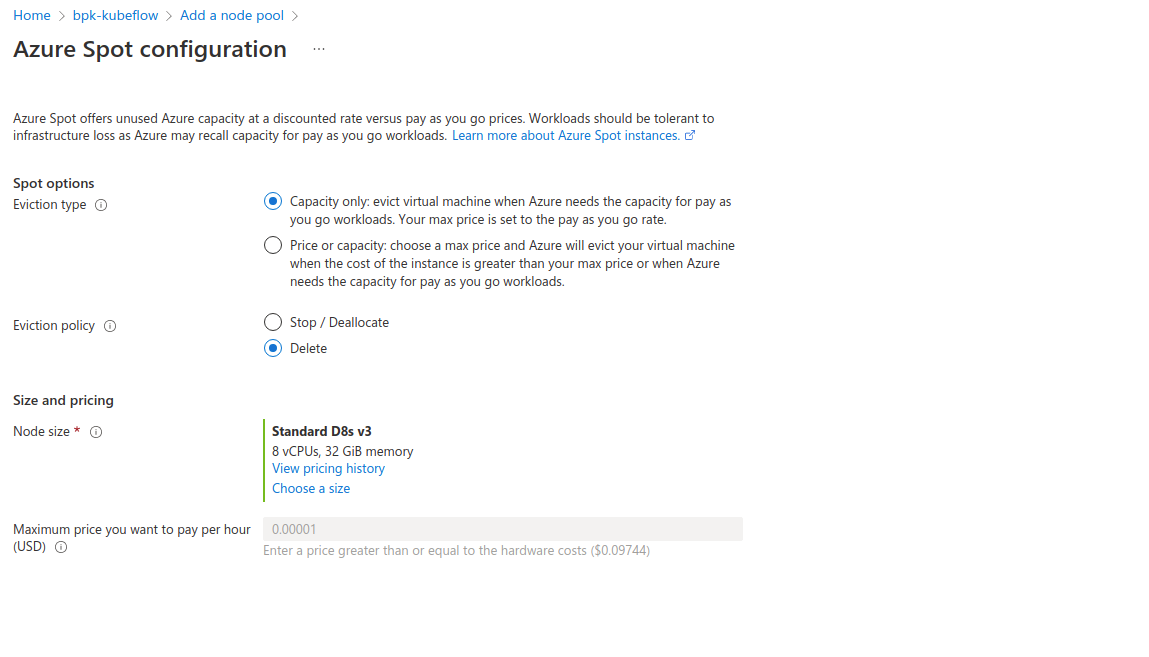Deploy Kubeflow pipelines with AKS spot instances¶
Charmed Kubeflow is an MLOps platform that delivers an end-to-end solution for AI/ML applications. It includes Kubeflow Pipelines, an engine for orchestrating different MLOps workflows.
Kubeflow pipelines can be created using Azure spot instances on an AKS cluster. This can save costs as long as appropriate tasks are chosen for the spot instances and their eviction is handled gracefully.
|
|
To create Kubeflow pipelines with spot instances, start with an AKS cluster containing an existing deployment of Charmed Kubeflow. Refer to Install Kubeflow on AKS for instructions.
Add spot instances¶
In the cluster details screen of your Kubeflow deployment on AKS, go to Settings > Node pools > Add node pool:

Select Enable Azure Spot instances:

Specify when and how your node should be evicted - Eviction type and Eviction policy. If you have a maximum price over which it is not worth running your workload, then specify that:

Create the pool after specifying all required fields. Once the VMs are up, check if all the nodes are available in the portal’s Node pools tab or on the command line using kubectl get nodes.
Update pipeline to allow task execution on spot instances¶
To enable tasks to execute on spot instances, use the Kubernetes toleration mechanism. Add an appropriate toleration to each task and if the tasks have to run on a certain type of node (say GPU required), include an affinity configuration to enforce the type of pods allowed.
Sample code¶
To try out the changes needed, you can clone this Kubeflow-examples repository and use the notebooks from the aks-spot-instances folder to create new notebooks in your Kubeflow deployment. Run the first notebook (01-base-workload) and use the Kubeflow Pipelines UI to see the workflow run details:

To check where the workflow steps were executed run kubectl get pods -n admin -o wide and in the NODE column, you’ll see that all the tasks were executed on agentpool:

The code used to create the pipeline was:
@dsl.pipeline(
name="base_pipeline",
description="my base pipeline",
)
def my_pipeline(url):
web_downloader_task = web_downloader_op(url=url)
merge_csv_task = create_step_merge_csv(file=web_downloader_task.outputs['data'])
client = kfp.Client()
client.create_run_from_pipeline_func(
my_pipeline,
arguments={
'url': 'https://storage.googleapis.com/ml-pipeline-playground/iris-csv-files.tar.gz'
})
Now, run the second notebook (02-spot-workload) to use spot instances. The pipeline definition in this code includes toleration and affinity. This configuration is done at the pipeline level and is applicable to each task, but the tasks themselves are unaware of it.
from kubernetes.client.models import V1Toleration, V1Affinity, V1NodeAffinity, V1NodeSelector, V1NodeSelectorTerm, V1NodeSelectorRequirement
@dsl.pipeline(
name="base_pipeline",
description="my base pipeline",
)
def my_pipeline(url):
web_downloader_task = web_downloader_op(url=url)
merge_csv_task = create_step_merge_csv(file=web_downloader_task.outputs['data'])
toleration = V1Toleration(
key="kubernetes.azure.com/scalesetpriority",
operator="Equal",
value="spot",
effect="NoSchedule",
)
web_downloader_task.add_toleration(toleration)
merge_csv_task.add_toleration(toleration)
aff = V1Affinity(node_affinity=V1NodeAffinity(
required_during_scheduling_ignored_during_execution=V1NodeSelector(
node_selector_terms=[V1NodeSelectorTerm(
match_expressions=[V1NodeSelectorRequirement(
key='kubernetes.azure.com/scalesetpriority',
operator='In',
values=['spot'])])]))
)
web_downloader_task.add_affinity(aff)
merge_csv_task.add_affinity(aff)
client = kfp.Client()
client.create_run_from_pipeline_func(
my_pipeline,
arguments={
'url': 'https://storage.googleapis.com/ml-pipeline-playground/iris-csv-files.tar.gz'
})
The results seen will be the same as before except for the node names. Run kubectl get pods -n admin -o wide | grep "spot-pipeline" to see that the tasks were executed on the spotpool.

Handle eviction gracefully¶
To handle spot eviction gracefully, set the retry policy for all tasks that are to be executed on a spot instance. This ensures that when the task fails, the pipeline will retry the task after waiting for a while (backoff_duration). It’ll keep doing this until a specified count of maximum retries (num_retries) is reached.
You can use the third notebook (03-spot-retries-workload) to try this out. Here the backoff duration is set to 5 minutes to give enough time for a new node to spawn and the max retry count is set to 5:
from kubernetes.client.models import V1Toleration, V1Affinity, V1NodeAffinity, V1NodeSelector, V1NodeSelectorTerm, V1NodeSelectorRequirement
@dsl.pipeline(
name="base_pipeline",
description="my base pipeline",
)
def my_pipeline(url):
web_downloader_task = web_downloader_op(url=url)
merge_csv_task = create_step_merge_csv(file=web_downloader_task.outputs['data'])
toleration = V1Toleration(
key="kubernetes.azure.com/scalesetpriority",
operator="Equal",
value="spot",
effect="NoSchedule",
)
web_downloader_task.add_toleration(toleration)
merge_csv_task.add_toleration(toleration)
aff = V1Affinity(node_affinity=V1NodeAffinity(
required_during_scheduling_ignored_during_execution=V1NodeSelector(
node_selector_terms=[V1NodeSelectorTerm(
match_expressions=[V1NodeSelectorRequirement(
key='kubernetes.azure.com/scalesetpriority',
operator='In',
values=['spot'])])]))
)
web_downloader_task.add_affinity(aff)
merge_csv_task.add_affinity(aff)
web_downloader_task.set_retry(num_retries=5, backoff_dureation="5m")
merge_csv_task.set_retry(num_retries=5, backoff_dureation="5m")
client = kfp.Client()
client.create_run_from_pipeline_func(
my_pipeline,
arguments={
'url': 'https://storage.googleapis.com/ml-pipeline-playground/iris-csv-files.tar.gz'
})
